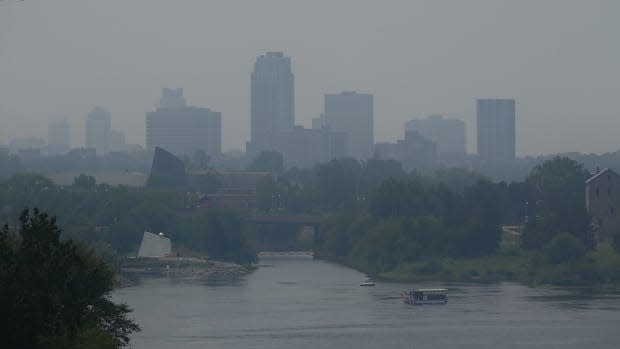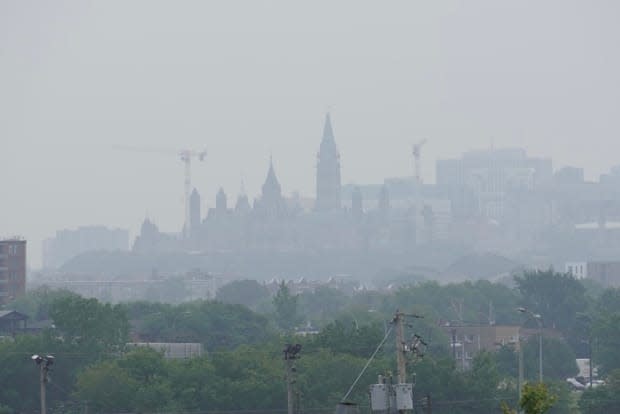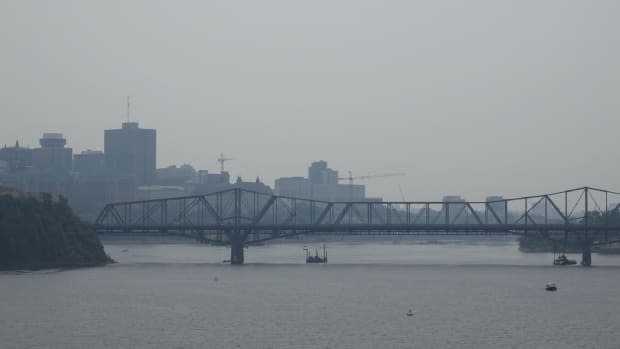Why the air in Ottawa is smoky, and how long it will last

The summer blue skies over the National Capital Region have been replaced with a grey, smoky haze over the past two days due to forest fires burning in northwest Ontario and east-central Manitoba.
CBC spoke to Environment Canada meteorologist Gerald Cheng to find out how faraway wildfires can have such a dramatic impact on the air we breathe.
Cheng said the simple explanation is that smoke from more than 200 wildfires burning in northwestern Ontario and Manitoba as of Tuesday travelled across the province and set up shop here.
The smoke from those fires — composed of a complex mixture of gases, particles and water vapour — is causing reduced visibility outdoors and poor air quality. It's also causing the sun to appear at times as a giant red ball.
The heightened presence of particulate matter and hazy conditions in the air prompted Environment Canada to issue an air quality statement for parts of eastern Ontario and a smog warning for western Quebec.
"We are worried about the concentration levels of a pollutant called PM 2.5," said Cheng. "It's the pollutant that is produced by the wildfires. And the source of it is really the fires in northwestern Ontario and in Manitoba."
PM 2.5 are microscopic soot particles that can be inhaled deep into the lungs where they may cause inflammation, irritation and trouble breathing, according to the B.C. Centre for Disease Control.

How did all this smoke get here?
Blame the airflow.
"It's really about how the winds are carrying the smoke to the rest of the province and to other regions," said Cheng. "And it's about the air circulation and how the air is traveling in the atmosphere."
"Everywhere from Windsor to Ottawa and even into Quebec — everybody is affected." - Gerald Cheng, Environment Canada meteorologist.
Cheng said over the weekend the air travelled from west to east, which took smoke from the fires in Manitoba and northwestern Ontario and pushed it east until it "invaded" northeastern Ontario.
Winds from the north then pushed the smoke south until it blanketed much of southern and eastern Ontario.
"That's why we're seeing this smoke in the area," said Cheng. "Everywhere from Windsor to Ottawa and even into Quebec — everybody is affected."

When will the haze dissipate?
The short answer: within the next 24 hours or so.
Cheng said a cold front made up of clean air is making its way south from Hudson Bay toward the region. It was expected to arrive Tuesday afternoon and that should slowly reduce the levels of PM 2.5 in the air and push the smoky air to the south and east.
"We are waiting for that to sweep through the Ottawa Valley and also clear the air," said Cheng.
Cheng said oftentimes air can get trapped in a valley, which causes it to take longer to dissipate when compared to flatlands.
"It does take longer than other areas that are at a higher elevation for the air to to be cleaned, to be swept out," said Cheng.
How is the smoke impacting air quality?
According to the Government of Canada, Ottawa's air quality was at a level 5 on a scale of 10 on Tuesday, signifying a moderate risk (10 or more signifies the highest risk, while 1 is considered low risk).
"When there's poor air quality, it really does affect the most vulnerable, the people who already have existing respiratory illnesses [like] asthma, for example," said Cheng. "It makes it hard to breathe."
Cheng said healthier individuals won't be affected as much.
"As the concentration levels drop, the air quality will improve," said Cheng. "But to see a marked difference, we will have to wait until Wednesday when we can breathe easier."

